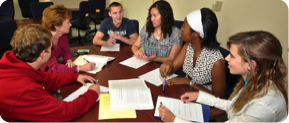WEb-Based Academic Support For Winthrop Psychology Majors

Advising, Course Selection, Registration
Reminders About What You Learned In PSYC 101
Reminders About What You Learned In PSYC 301/302
Internships and Service Learning
Writing Papers for Psychology Classes
Science and Pseudoscience In Psychology
Where to Find Credible Information on the Web
Oral Presentations in Psychology Classes
Resources For Undergraduate Research
Resources for Personal Productivity, Wellness, and Effectiveness
Employment Information for Psychology Majors
Professional Careers in Psychology
Marketing Yourself to Employers
Professional Careers in Psychology
The American Psychological Association (APA) recognizes 15 applied psychology specialties (e.g., Clinical Psychology, Forensic Psychology, Industrial-Organizational Psychology) and five proficiencies (e.g., Sport Psychology). Information about each speciality and proficiency is available here and here. Two applied specialities are discussed in the following paragraphs.
Clinical Psychology. Clinical psychologists assess and treat mental, emotional and behavioral disorders. These range from short-term crises, such as difficulties resulting from adolescent conflicts, to more severe, chronic conditions, such as schizophrenia. Some clinical psychologists treat specific problems exclusively, such as phobias or clinical depression. Others focus on specific populations — for instance, youths; familes or couples; ethnic minority groups; gay, lesbian, bisexual and transgender individuals; or older people. They also consult with physicians on physical problems that have underlying psychological causes. Clinical psychologists must be licensed by state psychology boards and and this usually requires a doctoral degree. In some states a masters degree permits practice with supervision. The following links provide more information:
• The Association of State and Provincial Psychology Boards(ASPPB) publishes information about licensure requirements for every state and this helpful article: Pathways to Licensure: What Every Student Should Know,
• The American Psychological Association provides a comprehensive web page about becoming a licensed psychologist. Especially helpful is this article: What You Need to Know to get Licensed.
School Psychology. School psychologists apply knowledge and skills in mental health, learning, and behavior, to help children and youth succeed academically, socially, behaviorally, and emotionally. They partner with families, teachers, school administrators, and other professionals to create safe, healthy, and supportive learning environments that strengthen connections between home, school, and the community. School psychologists typically complete either a specialist-level degree program (at least 60 graduate semester hours) or a doctoral degree (at least 90 graduate semester hours), both of which include a year-long 1200 hour supervised internship. School psychologists are typically licensed by state boards of education for practice in public schools or by state psychology boards for practice in other settings. The following links provide more information:
• Winthrop University offers a nationally accredited three year, full-time specialist-level graduate program. Advising guidance for Winthrop students interested in the program is available here.
• The National Association of School Psychologists provides comprehensive information about careers in school psychology. Click the link About School Psychology on the home page.
Academic and Nonacademic Careers in Psychology. Most university psychology department faculty positions require a doctoral degree with a specialty area such as social, developmental, or industrial-organizational psychology. However, many individuals who earn advanced degrees in psychology opt for nonacademic positions as discussed on this page.
